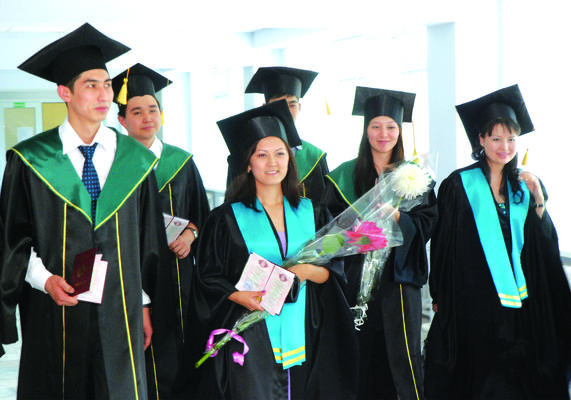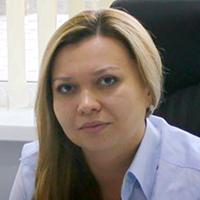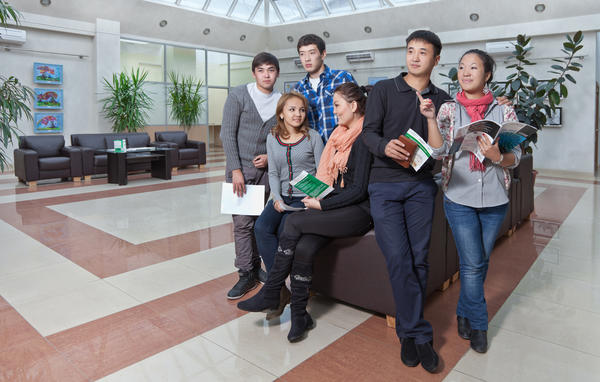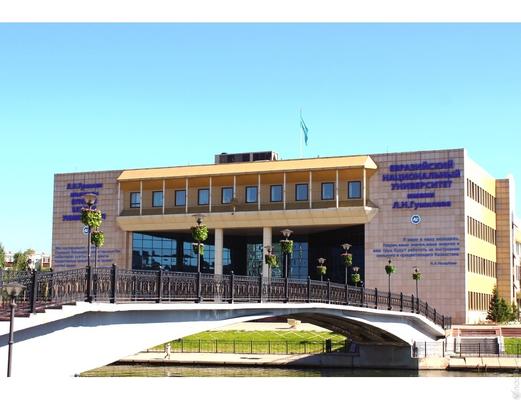Independent Agency for Accreditation and Rating in Kazakhstan


Alina B. ZHUMAGULOVA, Director of the Independent Agency for Accreditation and Rating, Candidate of Juridical Sciences.
One of the key factors of quality assurance is the competitive capacity of human capital, which in its turn is determined by the compliance of the educational system with the world labor market demands along with the national needs.
How does independent accreditation promote the improvement of quality in education? The Independent Agency for Accreditation and Rating (IAAR) presents the Kazakhstan experience in this field.
Over 25 years of independence Kazakhstan has achieved significant results in modernization of its educational system. Integration into the Bologna process allowed for positive changes in the system of higher education and resulted in improvements of the quality assurance system. Thus, the national quality assurance system in education (NQASE) envisages both the external and internal control of the quality of education. Its main tasks are related to the external assessment of students’ academic achievements at all levels of education particularly focusing on the assessment of activities performed by the educational process participants; improvement of teaching and learning; ensuring the consistency of assessment results between the stages of life-long learning; comparative monitoring of compliance of the national state compulsory educational standards (SCES) with the international educational standards.
The establishment of the institute of accreditation as an external quality assessment system was initiated in the country in 2011. It is not by chance, that one of the main parameters of the Bologna process is the accreditation procedure that is necessary for the official confirmation of compliance of an educational institution or a study program with the established criteria. Replacing state certification with independent accreditation became a fundamental step forward for Kazakhstan. However, the following accreditation procedures were of the utmost importance: the legal validation of its status and powers; the identification of its independence and voluntariness; and the development of mechanisms meant to encourage the external assessment of the quality of education. At the same time, the government reserved the right to select accreditation agencies through a recognition procedure and inclusion in the National Register of Accreditation Bodies, Accredited Educational Institutions and Study Programs.

The introduction of accreditation into Kazakhstan’s educational system is not only the process of “borrowing” from international practices, but it is also expected to bring intended outcomes. Namely, certification, which is conducted by accreditation agencies in accordance with the international standards, provides validity to the quality of education and ensures confidence of the society, the government, parents, and students in the educational system offered by the universities and colleges.
In 2017 Kazakhstan’s quality assurance system has started a new stage of development, the main role of which belongs to the process of international accreditation. It is legally determined that educational organizations have the right to undergo international accreditation in the foreign or national accreditation bodies that are full-fledged members of the international European networks of quality assurance and are listed in the register of the authorized body in education.
Nowadays accreditation in Kazakhstan is conducted by the Independent Agency for Accreditation and Rating (IAAR) and several other accreditation agencies. These agencies comprise domestic and international ones, which are recognized by the Ministry of Education and Science of Kazakhstan and included in the Kazakh National Register of Accreditation Institutions.
IAAR is a well-established quality assurance agency in education and is recognized both in Kazakhstan and abroad. Considerable work was accomplished; the first Kazakhstan’s experience of independent quality assessment was gained. For instance, for 5 years the Agency conducted accreditation of 46 educational institutions and 1,223 study programs of different levels of education.
On the eve of the 25th anniversary of Kazakhstan’s independence IAAR received international recognition in Europe. Furthermore, it became the first national accreditation body in Central Asia to have the status of a full member of the European Association for Quality Assurance in Higher Education (ENQA). This high assessment of IAAR activities as a reputable expert organization serves as the evidence of compliance of its external quality assurance procedures with the European standards. This achievement belongs not only to the agency employees, but also to the IAAR expert community and all proactive stakeholders involved in the accreditation process.
The European and international official recognition is a key strategic objective for IAAR. The work on joining the international networks for quality assurance was launched from the Agency’s foundation. Therefore, IAAR has been a full member of INQAAHE, CHEA, IREG, an intermediate member of APQN since 2011. Moreover, in 2015 IAAR became a full member of such a reputable European network as CEENQA—the Central and Eastern Europe Network for Quality Assurance Agencies in Higher Education.
The educational institutions and study programs accredited by the Agency would have the status of international accreditation due to full membership of IAAR in the recognized international European networks. Indeed, higher education institutions are interested in obtaining international accreditation, since it grants the right to issue state standard degree certificates and obtain state orders for personnel training.
For this reason, the governmental incentive of educational institutions to undergo the process of accreditation is truly essential. In accordance with the Law of Kazakhstan “On Education” effective from January 1, 2017, internationally accredited institutions only have the right to issue state standard diplomas and are entitled to receive government grants for provision of higher education. Moreover, since January 1, 2020 these incentive mechanisms will also be applied to the system of technical and vocational training.
International accreditation provides Kazakhstan institutions of higher education with an opportunity to position themselves in a competitive environment confirming their compliance with the international standards. On the one hand, it allows HEIs to improve the public opinion, to enhance the quality of the provided education, and to enroll more talented young people. On the other hand, it evidences the growth of the authority of the national accreditation body and indicates an increased demand for accreditation services.
The Independent Agency for Accreditation and Rating as a full member of ENQA intends to promote the policy and strategic objectives of this organization on the national level; to facilitate the European cooperation in the field of quality assurance; to contribute to harmonization of the European higher education. This status allows the Agency to carry out the international accreditation procedures in the countries that have signed the Bologna Declaration as well as in the Central Asia region.
However, the Agency does not stop half way and takes further steps to implement the strategic goals to enter EQAR—the European Quality Assurance Register for Higher Education that has gained a high degree of confidence based on the positive outcomes of the expert assessment of its activities. First and foremost, the decision on inclusion in EQAR depends on the results of the ENQA external assessment and compliance with the European Standards and Guidelines (ESG) for education quality assurance.
Upon the external audit outcomes the ENQA experts state that the IAAR standards implement the ESG 2015 recommendations for quality assurance systems and use instruments of objectivity, transparency, independence, awareness and accessibility, complying with new challenges in the context of integration of the national higher education system.
ESG require broad involvement of stakeholders in the activities of agencies and in the work of the international panel of experts aimed at ensuring the transparency of external quality assessment. With this in mind, IAAR established expert councils on higher, medical, technical, and vocational education, and also the Appeals and Complaints Commission. In fact, this appeal mechanism has a significant impact on the efficiency of the IAAR’s accreditation procedures and increases the responsibility of all the participants involved in the quality assessment process.
Currently, the Agency proactively develops social partnership with alliances and professional associations including the National Chamber of Entrepreneurs of Kazakhstan—Atameken, the National Medical Association of the Republic of Kazakhstan and others. IAAR signed memorandums with social partners in order to improve the accreditation standards and to enhance their compliance with employers’ requirements to the training of collaboration with social partners enables the Agency to increase its database of qualified experts, and to team up with expert groups and councils. The experts recommended by professional associations undergo training to develop competences of external audit and to shape independent behavior models. Thus, since 2015 training of employers recommended by regional chambers has been conducted under the Memorandum with the Atameken National Chamber of Entrepreneurs of Kazakhstan.
Unlike state accreditation, public and professional accreditation involves the external quality assessment carried out by expert representatives of the academic community, including employers, students, and foreign experts. Independent experts determine the degree of compliance of educational organizations or study programs with the quality standards and make recommendations for their improvement.

The most important criterion for accreditation, based on the principle of voluntariness and independence, is trust and confidence in the accreditation decision-makers. In this regard, the IAAR Accreditation Council includes representatives from the Majilis of the Kazakhstan Parliament, non-governmental and public organizations, national companies, research institutions, and students. These representatives were recommended by the state bodies, the Association of Kazakhstan Institutions of Higher Education, the Atameken National Chamber of Entrepreneurs, and Youth Committee. Obviously, the stakeholders rely on a good reputation in the academic, scientific or professional community, and this credibility facilitates the objective decision making on quality. The business reputation of the IAAR Accreditation Council members is the “added value” of professionals to ensure the quality of education and to gain recognition from the public and the state.
The work of the Agency is based on the principles of feedback, mutually beneficial partnership, and also on the maximum liability for undertaken commitments. IAAR developed the mechanisms for the internal and external feedback resulting in the continuous improvement of its performance. Annually the Agency analyzes opinions of its customers, explores the expectations of higher education institutions from external quality assessment and studies the impact of accreditation on their further development. A survey of experts enables the Agency to improve the quality assurance procedures, the contents of standards and criteria.
IAAR also develops mutually beneficial cooperation with the recognized foreign agencies to ensure the quality of higher education. Bilateral cooperation agreements were signed with such organizations as: the Foundation for International Business Administration Accreditation (FIBAA, Germany); the Accreditation Agency for degree programs in Engineering, Informatics, Natural Sciences and Mathematics (ASIIN e.V., Germany); the Accreditation Council for Business Schools and Programs (ACBSP, USA); the National Center for Public Accreditation (NCPA, Russia); the Accreditation, Certification and Quality Assurance Institute (ACQUIN, Germany); the National Accreditation Agency (NAA, Russia); the Agency for Quality Assurance in Higher Education and Career Development (AKKORK, Russia); the Agency for Development of Higher Education and Quality Assurance (HEA, Bosnia and Herzegovina); the Academic Information Centre (AIC, Latvia). Foreign partners assist in the IAAR procedures of external quality assessment, participate in joint activities and nominate foreign experts for external expert committees of the Agency.
The proactive work with educational institutions continues after they have been accredited by the Agency. It involves the mechanism of post accreditation procedures, such as periodic monitoring of the implementation of the Agency’s recommendations. It should be noted that the processes of improving the quality of education are not discrete but continuous.
Overall, the Kazakhstan system of independent accreditation as an external assessment procedure has gained positive recommendations. Accreditation serves as an effective instrument for ensuring the quality, prestige and good reputation of a higher education institution. Additionally, it assures public confidence in the quality of higher education and is beneficial for the implementation of the basic parameters of the Bologna process.
The Independent Agency for Accreditation and Rating has developed and holds exclusive copyrights for institutional and specialized accreditation standards on all levels of education.
These accreditation standards are based on the European Standards and Guidelines (ESG) for education quality assurance and on cultural specificity of Kazakhstan education.
Institutional Standards for Higher and Postgraduate Education
- Strategic development and quality assurance
- Leadership and management
- Design and approval of study programs
- Student-centered learning, teaching and performance assessment
- Students
- Faculty
- Research
- Funding
- Educational resources and student support systems
- Information management
- Public information
Standards for Specialized Accreditation (Study Program Accreditation)
- Management of study programs
- Design and approval of study programs
- Student-centered learning, teaching and performance assessment
- Students
- Faculty
- Educational resources and student support systems
- Information management
- Public information
- Majors